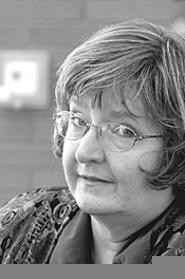If the obituary writer is anything like Baranick, he will mention her love for Star Wars, her mission to visit every U.S. location named Cleveland, and the two sons who survive her -- one a "heathen rock-and-roller," the other a Christian proselytizer.
But the first line of her death notice will almost certainly describe her as the 2005 recipient of the award for best obituary writing given by the American Society of Newspaper Editors -- no small accomplishment, since she beat out reporters from The New York Times and The Washington Post.
"With vivid detail and direct language, Baranick creates richly textured portraits of everyday folks who become extraordinary through her words," the judges said of her work.
Since joining The Plain Dealer in 1992, Baranick has written more than 1,000 obituaries. In the process, she's turned what was once considered a journalistic backwater into an art form all its own. This August will see the publication of Baranick's Life on the Death Beat, a how-to manual of sorts for aspiring obit writers.
"I like that I never have to search for story ideas," she says. "People are dying to get into my columns."
To look at her, you'd never know she dwells on death for a living. She's an earthy 55-year-old with wispy blonde hair, wire-rimmed glasses, and a sunny disposition.
Baranick fell into her grim trade by accident. She was working at The Chronicle-Telegram when she started receiving calls from funeral directors who were in such a hurry to get to the weekly high school football game that they didn't want to wait for the regular obit writer to show up at 7 p.m.
Eventually, Baranick started writing obituaries regularly, in addition to covering heavy-metal music and religion. "I used to say that my beat was death, God, and rock and roll," she says.
What separates Baranick from colleagues on the death beat is her ability to unearth the kinds of idiosyncratic details that bring characters to life, says Chris Quinn, her editor at The PD for three years. "Alana makes dead people seem more alive than people who are actually living."
She's also not afraid to find humor in her somber subject matter. When Baranick received a death notice for John "Happy" Laffin, she was intrigued by his unusual name. The obituary she ended up writing revealed that "Happy" owned a service station called "Laffin Gas" and that his wife went by her initials: "I.M. Laffin."
Then there was the obituary for Clementine Werfel, a housekeeper at St. Joseph Catholic Church. Every morning, Werfel would ask each priest if he wanted regular or decaf -- then fill all their mugs from the same pot.
"It was as though Werfel really could turn regular coffee into decaffeinated, much the way that the biblical Jesus turned water into wine," Baranick wrote.
Thanks to her approach, Baranick's services are in high demand -- even among people who are in the pink. Dan Coughlin, the sports reporter for WJW-Fox 8 Cleveland, has announced that he wants Baranick to write his obit when he dies.
"She just better not retire anytime soon, because I'm not changing my life schedule to accommodate hers," he jokes.
Getting into Baranick's column can be like gaining admittance to an exclusive country club. The rich and powerful assume they'll get write-ups, but Baranick likes to focus on the quirky everyman.
A recent assignment found her writing about Joe Bush, an 88-year-old man who so loved horses that he once stopped a band from playing at a parade because it was spooking the colts.
When Baranick arrived at the home of Bush's daughter, Madelon Nilsson, she found a family gripped with grief.
"What should I do? How does this work?" Nilsson asked in a small voice, clenching a Kleenex tightly in her right hand.
Baranick quickly took over, guiding Nilsson to the kitchen table, where they pored over photographs of her late father. Then, over glasses of chilled lemonade, Baranick chatted with Nilsson in the conversational tone of gossipy girlfriends. When the interview finished, Baranick's notebook was fat with anecdotes.
Sometimes, perhaps out of reluctance to speak ill of the dead, families don't offer the full story. It can pose a problem for Baranick.
She once wrote about an elderly woman who had enjoyed several marriages before she died. The woman's son described her loving relationship with her many ex-husbands.
It was only after the obit went to print that Baranick learned what the son had kept from her: The woman had another husband whom she had been accused of killing. Baranick's only consolation: At least the old woman was acquitted.
If a newspaper's front page is the first draft of history, obituaries are the closest it comes to a final judgment.
"Historians base their version of history on obituaries," Baranick says. "That's why so much of history is faulty -- it was how it was spun by the obituary writers," many of whom, she claims, "operated like the spinmeisters today."
For prominent people, newspapers keep obits in the can to use when they die. Art Modell, for example, has gone from savior to sinner in the many drafts of his death announcement.
Baranick had a similar experience with George Younce, an ailing singer enshrined in the Gospel Hall of Fame. Each time Younce sang, Baranick freshened her obituary to include details of his last performance. For a supposedly sickly man, Baranick says, Younce had a lot of "last appearances."
As for her own legacy, Baranick looks back at 20 years on the death beat with satisfaction. She has but one regret: "I never get to meet all the interesting people I write about."


